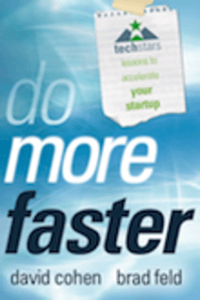Do More Faster: TechStars Lessons to Accelerate Your Startup is the new book by David Cohen, founder and CEO of TechStars, and Brad Feld, managing director of Foundry Group. Contributors include dozens of TechStars mentors and founder alumni, including Dharmesh Shah the founder and CEO of HubSpot and the curator of the OnStartups blog and community. Below is his chapter, Avoid Co-Founder Conflict. Find out where Cohen and Feld’s book tour will stop next here.

A common reason for startup fatalities, particularly in the early days, is some sort of conflict between co-founders. One of the main reasons for co-founder conflict is that many aspects of the relationships were either ill-defined or misunderstood. To minimize the chance of this, it’s critical that you and your co-founders come to agreement on some key issues. I’ve framed the most important of these as a set of questions that the co-founders should be asking each other as they enter into the business relationship.
Many of these questions are hard but they get only harder with time. The sooner you address them, the better off your startup will be.
More excerpts from “Do More Faster”
Title chapter: “Do More Faster” by David Cohen
How should we split the equity? While there can be different aspects to this, the basic question is really simple: Who gets what percentage of the company? There are different schools of thought on how to arrive at an equitable answer. A perennial favorite is to decide that each founder should own an equal share. Or, you could try to come up with some formula that uses a bunch of different factors such as experience, market value, contribution to date, and expected contributions in the future. However you do it, the important thing is to decide it up front and not put off the discussion.
How will decisions get made? This is often tied to the number of shares, but not necessarily. You can have voting and non-voting shares. You can set up a board. You’ll need to decide what kinds of decisions the board makes, and which ones it won’t. Common areas to address are decisions around capitalization, executive hiring and firing, share issuance (dilution), and acquisitions.
What happens if one of us leaves the company? Although it may seem like a bad idea to be talking about this when you’re starting the company–it’s not. In the evolution of any startup, there will be good times and bad times and there will likely be times when one or more co-founders are simply not happy and not committed. You should decide how to treat this situation early when it is easier and everyone is at least semi-rational and optimistic about their future involvement in the company. The last thing the company needs is a co-founder who is no longer engaged but is hanging around out of guilt or ambiguity. Or worse, one that claims equity that you don’t believe is due.
Can any of us be fired? By whom? For what reasons? Yes, that’s right–even co-founders can be terminated. Too many people mix the notion of being a shareholder in a startup and having an operating role. These two things should be thought of as separate and distinct. The company should have a mechanism for gracefully terminating the operating role of a co-founder if that’s the right thing to do. This is never fun but it should be discussed up front.
What are our personal goals for the startup? Although this can change over time, it’s helpful to at least get a sense of what each of the co-founders wants to get from the company. If you have one co-founder who wants to build a sustainable business that is spinning off cash and run it forever and another one who wants to shoot for high growth with some type of massive exit through a sale to a much larger company, it’s better to get that out in the open early and talk it through.
Will this be the primary activity for each of us? Co-founder conflict can stem from misunderstandings around how committed everyone is. Will one of the co-founders be keeping a day job until the company gets off the ground? Will one be working on another sideline business? Under what circumstances will someone decide that they just can’t commit to the business full time anymore; for example, if the founders have to go without a salary for six months.
What part of our plan are we each unwilling to change? Not all startups need to change their plans during the course of their evolution; just the ones that want to survive and succeed! However, there may be elements of the plan that you don’t want to change. This might relate to the product being built or the market being addressed. For example, if one of the founders is fanatically obsessed with wanting to create a consumer software company that lots of people know about, then friction may be created if the model needs to shift to more of an enterprise product.
What contractual terms will each of us sign with the company? One of the best examples of this is a noncompete agreement. Will each of the co-founders be signing some sort of contract with the company beyond the shareholder agreement? If so, what are the terms of this agreement? At a minimum, all founders should be willing to assign whatever they develop to the company.
Will any of us be investing cash in the company? If so, how is this to be treated? It is very likely that one or more co-founders will be putting in some cash in the early stages of the company. It is critical to decide up front how this cash will be treated. Is it debt? Is it convertible debt? Does it buy a different class of shares? What happens if the company raises follow-on funding?
What will we pay ourselves? Who gets to change this in the future? This can be a touchy issue. Risk tolerance varies by individual and it is a good idea to factor this into determining the compensation plan for the founders. The issue can be clouded sometimes when one of the founders is investing significant cash into the enterprise.
What are the financing plans for the company? Will the company be self-funded and bootstrapped? Raise angel funding? Raise venture capital funding? What happens if this doesn’t occur?
While I’m sure there are other issues that could generate cofounder conflict, you’ll decrease your chances of misunderstandings and implosion of the team if you visit each of the issues identified here early in the life of your startup.










